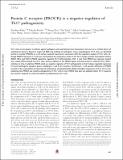| dc.contributor.author | Kishi, Yasuhiro | |
| dc.contributor.author | Kondo, Takaaki | |
| dc.contributor.author | Xiao, Sheng | |
| dc.contributor.author | Yosef, Nir | |
| dc.contributor.author | Gaublomme, Jellert | |
| dc.contributor.author | Wu, Chuan | |
| dc.contributor.author | Wang, Chao | |
| dc.contributor.author | Chihara, Norio | |
| dc.contributor.author | Regev, Aviv | |
| dc.contributor.author | Joller, Nicole | |
| dc.contributor.author | Kuchroo, Vijay K. | |
| dc.date.accessioned | 2017-05-02T17:41:05Z | |
| dc.date.available | 2017-05-02T17:41:05Z | |
| dc.date.issued | 2016-09 | |
| dc.date.submitted | 2015-07 | |
| dc.identifier.issn | 0022-1007 | |
| dc.identifier.issn | 1540-9538 | |
| dc.identifier.uri | http://hdl.handle.net/1721.1/108596 | |
| dc.description.abstract | Th17 cells are key players in defense against pathogens and maintaining tissue homeostasis, but also act as critical drivers of autoimmune diseases. Based on single-cell RNA-seq profiling of pathogenic versus nonpathogenic Th17 cells, we identified protein C receptor (PROCR) as a cell surface molecule expressed in covariance with the regulatory module of Th17 cells. Although PROCR expression in T cells was controlled by the cooperative action of the Th17 lineage-specific transcription factors RORγt, IRF4, and STAT3, PROCR negatively regulated Th17 differentiation. CD4+ T cells from PROCR low expressor mutant mice readily differentiated into Th17 cells, whereas addition of the PROCR ligand, activated protein C, inhibited Th17 differentiation in vitro. In addition, PROCR acted as a negative regulator of Th17 pathogenicity in that it down-regulated expression of several pathogenic signature genes, including IL-1 and IL-23 receptors. Furthermore, T cell–specific deficiency of PROCR resulted in the exacerbation of experimental autoimmune encephalomyelitis (EAE) and higher frequencies of Th17 cell in vivo, indicating that PROCR also inhibits pathogenicity of Th17 cells in vivo. PROCR thus does not globally inhibit Th17 responses but could be targeted to selectively inhibit proinflammatory Th17 cells. | en_US |
| dc.language.iso | en_US | |
| dc.publisher | Rockefeller University Press, The | en_US |
| dc.relation.isversionof | http://dx.doi.org/10.1084/jem.20151118 | en_US |
| dc.rights | Creative Commons Attribution-Noncommercial-Share Alike 3.0 Unported license | en_US |
| dc.rights.uri | http://creativecommons.org/licenses/by-nc-sa/3.0/ | en_US |
| dc.source | Rockefeller University Press | en_US |
| dc.title | Protein C receptor (PROCR) is a negative regulator of Th17 pathogenicity | en_US |
| dc.type | Article | en_US |
| dc.identifier.citation | Kishi, Yasuhiro; Kondo, Takaaki; Xiao, Sheng; Yosef, Nir; Gaublomme, Jellert; Wu, Chuan; Wang, Chao, et al. “Protein C Receptor (PROCR) Is a Negative Regulator of Th17 Pathogenicity.” The Journal of Experimental Medicine 213, no. 11 (September 2016): 2489–2501. © 2016 Kishi et al. | en_US |
| dc.contributor.department | Broad Institute of MIT and Harvard | en_US |
| dc.contributor.mitauthor | Regev, Aviv | |
| dc.relation.journal | Journal of Experimental Medicine | en_US |
| dc.eprint.version | Final published version | en_US |
| dc.type.uri | http://purl.org/eprint/type/JournalArticle | en_US |
| eprint.status | http://purl.org/eprint/status/PeerReviewed | en_US |
| dspace.orderedauthors | Kishi, Yasuhiro; Kondo, Takaaki; Xiao, Sheng; Yosef, Nir; Gaublomme, Jellert; Wu, Chuan; Wang, Chao; Chihara, Norio; Regev, Aviv; Joller, Nicole; Kuchroo, Vijay K. | en_US |
| dspace.embargo.terms | N | en_US |
| dc.identifier.orcid | https://orcid.org/0000-0001-8567-2049 | |
| mit.license | PUBLISHER_CC | en_US |
